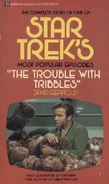m (adding disambig) |
m (lk fixes) Tag: sourceedit |
||
| (10 intermediate revisions by 7 users not shown) | |||
| Line 1: | Line 1: | ||
| + | {{realworld}} |
||
{{Sidebar reference book| |
{{Sidebar reference book| |
||
| − | | |
+ | | image = Making of the trouble with tribbles.jpg |
| Author = [[David Gerrold]] |
| Author = [[David Gerrold]] |
||
| Publisher = [[Ballantine Books]]<br />[[Del Rey]] |
| Publisher = [[Ballantine Books]]<br />[[Del Rey]] |
||
| Line 6: | Line 7: | ||
| ISBN = 0345234022<br />ISBN 0345347889<br />(Del Rey reprint) |
| ISBN = 0345234022<br />ISBN 0345347889<br />(Del Rey reprint) |
||
}} |
}} |
||
| − | {{disambiguation link |
+ | {{disambiguation link}} |
| − | '''''The Trouble |
+ | '''''The Trouble With Tribbles: The Birth, Sale and Final Production of One Episode''''' tells how [[The Trouble with Tribbles (episode)|the eponymous episode]] came to be written by the script's author, [[David Gerrold]]. |
Gerrold, then a twenty-two year-old college student majoring in theater arts, relates how, after watching the premiere episode, {{e|The Man Trap}} on September 8, 1966, he immediately sat down and began a sixty-page outline entitled "Tomorrow Was Yesterday", which concerned the ''Enterprise'' discovering a "generation" ship. He managed to get an agent to submit it to ''Star Trek'', and though [[Gene L. Coon]] rejected it as being too expensive to film, he was impressed with Gerrold's writing ability and invited him to visit his office to talk. Although ''Star Trek'' was already booked up on episodes for the first season, Coon expressed a willingness to take pitches for second season episodes. |
Gerrold, then a twenty-two year-old college student majoring in theater arts, relates how, after watching the premiere episode, {{e|The Man Trap}} on September 8, 1966, he immediately sat down and began a sixty-page outline entitled "Tomorrow Was Yesterday", which concerned the ''Enterprise'' discovering a "generation" ship. He managed to get an agent to submit it to ''Star Trek'', and though [[Gene L. Coon]] rejected it as being too expensive to film, he was impressed with Gerrold's writing ability and invited him to visit his office to talk. Although ''Star Trek'' was already booked up on episodes for the first season, Coon expressed a willingness to take pitches for second season episodes. |
||
| − | When Gerrold met with Coon he pitched at least five story lines – among them, " |
+ | When Gerrold met with Coon he pitched at least five story lines – among them, "{{dis|Bandi|outline}}", "[[The Protracted Man]]", and "[[The Fuzzies]]". Coon initially rejected them all, but a while later called Gerrold's agent and said he wanted to talk to Gerrold about his "Fuzzies" idea. |
After Coon expressed interest in the premise, Gerrold wrote the outline, now entitled "A Fuzzy Thing Happened To Me..." Coon eventually bought the outline, and Gerrold scripted it as {{e|The Trouble with Tribbles}}. |
After Coon expressed interest in the premise, Gerrold wrote the outline, now entitled "A Fuzzy Thing Happened To Me..." Coon eventually bought the outline, and Gerrold scripted it as {{e|The Trouble with Tribbles}}. |
||
| − | This book details the writing process, the filming, and the various rewards that have come Gerrold's way as a result of the episode. It also touches on the similarities between the [[tribble]]s and the proliferating Martian Flat Cats in Robert A. Heinlein's 1952 novel ''The Rolling Stones''. |
+ | This book details the writing process, the filming, and the various rewards that have come Gerrold's way as a result of the episode. It also touches on the similarities between the [[tribble]]s and the proliferating Martian Flat Cats in [[Robert A. Heinlein]]'s 1952 novel ''The Rolling Stones''. |
| + | <gallery> |
||
| + | File:Trouble with Tribbles book reprint.jpg|Reprint cover |
||
| + | </gallery> |
||
[[Category:Reference books|Trouble with Tribbles, The]] |
[[Category:Reference books|Trouble with Tribbles, The]] |
||
Revision as of 19:24, 7 October 2015
Template:Realworld
The Trouble With Tribbles: The Birth, Sale and Final Production of One Episode tells how the eponymous episode came to be written by the script's author, David Gerrold.
Gerrold, then a twenty-two year-old college student majoring in theater arts, relates how, after watching the premiere episode, "The Man Trap" on September 8, 1966, he immediately sat down and began a sixty-page outline entitled "Tomorrow Was Yesterday", which concerned the Enterprise discovering a "generation" ship. He managed to get an agent to submit it to Star Trek, and though Gene L. Coon rejected it as being too expensive to film, he was impressed with Gerrold's writing ability and invited him to visit his office to talk. Although Star Trek was already booked up on episodes for the first season, Coon expressed a willingness to take pitches for second season episodes.
When Gerrold met with Coon he pitched at least five story lines – among them, "Bandi", "The Protracted Man", and "The Fuzzies". Coon initially rejected them all, but a while later called Gerrold's agent and said he wanted to talk to Gerrold about his "Fuzzies" idea.
After Coon expressed interest in the premise, Gerrold wrote the outline, now entitled "A Fuzzy Thing Happened To Me..." Coon eventually bought the outline, and Gerrold scripted it as "The Trouble with Tribbles".
This book details the writing process, the filming, and the various rewards that have come Gerrold's way as a result of the episode. It also touches on the similarities between the tribbles and the proliferating Martian Flat Cats in Robert A. Heinlein's 1952 novel The Rolling Stones.

